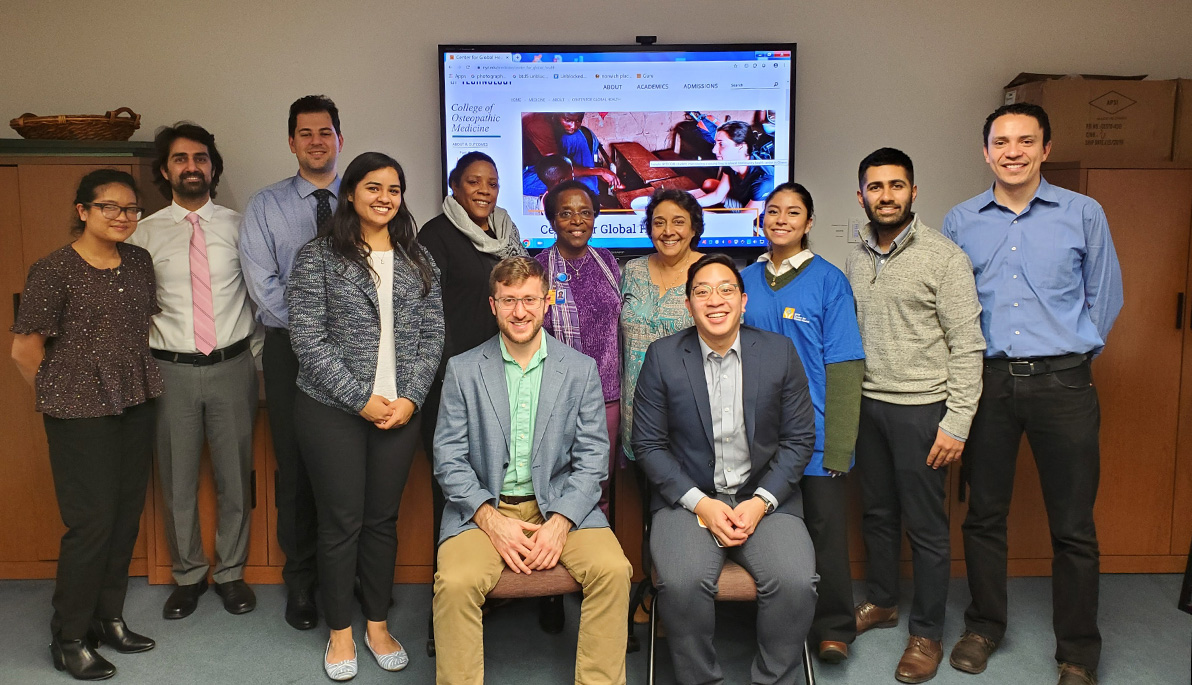News
Center for Global Health Hosts First Case Competition
January 14, 2020
Standing, from left: Nina Luksanapol, Taysir Al Janabi, Gergory Kurganski, Amanda Makol, Associate Professor Melanie Austin, Director of the Center for Global Health Lillian Niwagaba, Associate Professor Zehra Ahmed, Nicole Menendez, Taimur Hamid, and Juan Maillane. Seated: Justin Morris and Tyler Nghiem.
NYIT College of Osteopathic Medicine student Tyler Nghiem reports on the Center for Global Health’s first Global Health Case competition.
In today’s global health landscape, public health solutions cannot be formed only in the health sector. Creating solutions at the international level requires collaboration from different backgrounds ranging from economics, law, finance, engineering, healthcare, and computer science to advance health worldwide.
In December, three interdisciplinary teams of New York Institute of Technology students participated in the first Global Health Case competition hosted by New York Tech’s Center for Global Health. The competition is designed to encourage interdisciplinary teams to devise a solution for a projected global health issue. This year’s case challenged the teams to organize and implement hurricane disaster preparedness strategies in the Dominican Republic, Japan, and the Philippines. Teams of one to four students were assigned to a country and included students from various disciplines, such as medicine, physician assistant studies, engineering, psychology, and business.
Teams had one week to come up with their solutions. NYIT College of Osteopathic Medicine student Justin Morris and myself acted as the teams’ advisors as they worked on their proposals. At the end of the week, the students presented their work to a team of judges that included Assistant Professor and Chair of Physician Assistant Studies Zehra Ahmed, M.B.B.S., Associate Professor of Occupational Therapy Melanie Austin, O.T.D., M.P.A., and Director of the Center for Global Health Lillian Niwagaba, Ph.D. Ultimately, Team Philippines took first place in the competition.
“This experience gave me a different perspective on global health conflict and disaster relief on a national level,” said Nicole Menendez, Team Philippines. “The competition taught me the responsibility we all have to help one another.”
Team Proposals:
- Team Dominican Republic: Amanda Makol, OMS II; Taysir Al Janabi, OMS I; Gergory Kurgansky, OMS II
The team focused their solution on the environmental impacts hurricanes have on the Dominican Republic. They proposed upgrading the country’s disaster relief efforts already in place by creating a center for disaster preparedness as well as using the Beacon Emergency Dispatch platform to better dispatch EMS. They also proposed the use of desalination plants, where mineral components can be removed from saline water after disaster strikes. - Team Japan: Nina Luksanapol, OMS III
“Thousands have lived without love, not one without water,” by W.H. Auden inspired Nina Luksanapol to target waterborne diseases that plagued the sandwich generation of Japan after Typhoon Jebi struck in 2018. (The sandwich generation comprises adults who have a parent over the age of 65 and are raising a child under the age of 18 or supporting a grown child.) Her solution included implementing tax incentives to build flood-proof homes or retrofit them to be flood-proof as well as build environmental barriers in Japan’s industrialized infrastructure, such as dunes, berms, restoration programs for wetlands, and levees. - Team Philippines: Joseph Singer, physician assistant studies; Taimur Hamid,OMS II; Nicole Menendez, psychology; Juan Maillane, energy management The students’ proposal centered on microfinancing and preparation. Their plan, set with five- and 10-year goals, included investing in reestablishing local small businesses in the Luzon region. The team proposed creating hurricane safe zones and disaster centers, and procuring animal and seed shelters for farmers, which would protect agriculture in the future.




